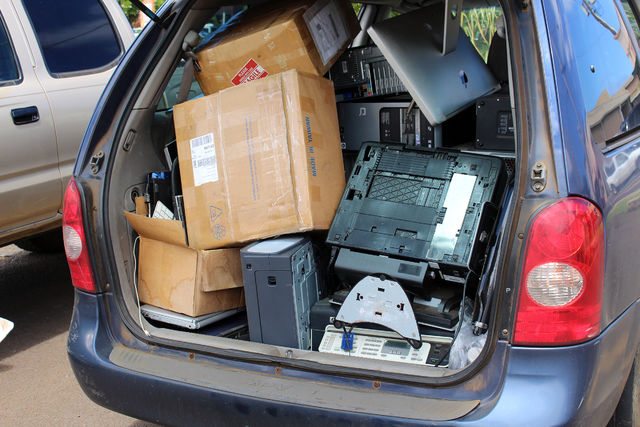KAPAA — Computer Hospital owner Jeff Elkins’ troubles began when he received a warning letter from the Hawaii Department of Health asking him to cease and desist his “unpermitted operation of a solid waste management system.” Elkins said by-products of
KAPAA — Computer Hospital owner Jeff Elkins’ troubles began when he received a warning letter from the Hawaii Department of Health asking him to cease and desist his “unpermitted operation of a solid waste management system.”
Elkins said by-products of his computer retail and repair shop business are old computers, accessories and other hardware he dismantles for spare parts.
“We have traditionally allowed people to add stuff to our stack, for no charge,” Elkins said. “I have never solicited, or collected, or processed, or profited in any way from my recycling efforts.’’
The Computer Hospital, which has been around since 1997, has been a supporter of the state’s e-waste recycling program from the very start, and his shop generates quite a bit of e-waste, all of which it recycles.
Elkins said he was surprised when he received the cease and desist letter last month from the DOH, even after an inspector has stopped by and told him he was in compliance.
“When the inspector came to my shop, he told me, ‘Well, this looks like the natural extension of your business.’ That’s what he told me,” Elkins said. “He said there isn’t any outside scrap. It looks like you guys are in compliance. The inspector went back to his boss and told him that I wasn’t doing anything wrong. And his boss wrote me the hate letter.”
The letter warned Elkins to “immediately cease accepting electronic waste at the subject site” and gave him the option to submit an application should he decide to operate a solid waste management facility.
The letter also noted that any violations could cost Elkins up to $10,000 in fines for each separate offense of illegally dumping e-waste.
Elkins shot back with his own letter to Steven Chang, chief of the DOH Solid and Hazardous Waste Branch.
“It takes quite a stretch of imagination to suggest that what I am running here is a ‘waste management system’ or a recycling facility of any kind,” Elkins wrote in the letter. “What I have here is a small pile of junk comprised of unfixable computers, monitors and associated parts that is generated as a natural byproduct of my business, which is fixing computers.”
Elkins said that every time the pile got too big, he’d pack it onto a trailer and take it down to the county’s refuse transfer station near Ahukini.
“This scrap pile is not toxic or hazardous in any way and poses absolutely no imaginable threat to public health, nor is it even visible to the public (as an) eyesore,” Elkins wrote. “The idea that it should even draw the attention of your office is just plain silly. It’s a little stack of broken computers.”
Chang told The Garden Island that it’s hard to put a number on how many warning letters his office sends out.
Although he did not comment on Elkins’ case, he said a lot of responses are driven by complaints from people within the community.
“Someone may have seen a big pile of trash,” he said. “They might have wondered if the business is operating under a permit.”
A few weeks after sending the letter, Elkins packed up nearly half of his stack of computers from The Computer Hospital and took it down to Puhi Metals Recycling Center. They told him they would not accept the e-waste unless he jotted down “every piece, every part and every brand.”
“I am so pissed off that I can’t believe it,” Elkins said. “Honestly, I don’t expect the state health department to pursue me any further. They have made a law that said it’s illegal for me to throw this in a Dumpster. I expect them to take it at the place where they said they will accept it. When I went there (PMRC) today, they refused me.”
Elkins then drove to the Lihue Transfer Refuse Station and spoke to county employees, who told him that PMRC should not have refused him, he said.
He went back to the facility. That time, his van, with nearly 40 to 50 computers inside and boxes of miscellaneous parts, was unloaded.
Ryan Evans, manager of Resource Recovery Solutions, said his company has never refused service to anyone before.
“What happened was a simple misunderstanding,” Evans said. “When he arrived, he went straight to warehouse, instead of to the office where he was supposed to go. He asked the boys in our warehouse. They told him that he needed to log down everything — what type of units by brand. Then he went to office and they told him the same thing.”
Evans said Elkins then got into his van and drove off. Afterwards, he received a call from the county, which has a contract with PMRC to dispose of metals, and Elkins returned.
Evans said one time the state brought in nearly two tons of e-waste consisting of computers and other hardware.
“We don’t turn away anybody,” Evans said. “Elkins didn’t have that much. But I told him, if people come in with big loads, you’re going to have to wait. If they come in a big load, it would be easier if they log it themselves instead of have us do it. Otherwise, they are just going to have to wait.”
Elkins said he understood that what Evans wanted was a rough checklist of the items he brought.
“I told him I could do that, no problem, and I know where to take my e-waste,” Elkins said in an email.
PMRC is not under contract to dispose of e-waste for the county and does so as a service to the community, Evans said. He doesn’t charge businesses for the service, he said.



